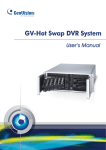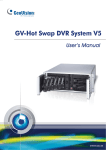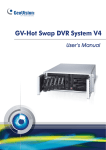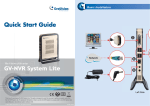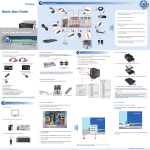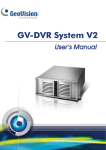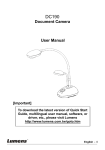Download GV-Tower System
Transcript
GV-Tower System User’s Manual Tower-UM-C © 2015 GeoVision, Inc. All rights reserved. Under the copyright laws, this manual may not be copied, in whole or in part, without the written consent of GeoVision. Every effort has been made to ensure that the information in this manual is accurate. GeoVision, Inc. makes no expressed or implied warranty of any kind and assumes no responsibility for errors or omissions. No liability is assumed for incidental or consequential damages arising from the use of the information or products contained herein. Features and specifications are subject to change without notice. GeoVision, Inc. 9F, No. 246, Sec. 1, Neihu Rd., Neihu District, Taipei, Taiwan Tel: +886-2-8797-8377 Fax: +886-2-8797-8335 http://www.geovision.com.tw Trademarks used in this manual: GeoVision, the GeoVision logo and GV series products are trademarks of GeoVision, Inc. Windows and Windows XP are registered trademarks of Microsoft Corporation. April 2015 User’s Manual for GV-Tower System Welcome to the GV-Tower DVR/NVR System and GV-Tower VMS System User’s Manual. The Manual provides an overview of the GV-Tower DVR/NVR System and GV-Tower VMS System and its accessories. It also includes the instructions to guide you through the installation and use of the GV-Tower DVR/NVR System and GV-Tower VMS System: • Chapter 1, Introduction Identifies the accessories and options of the GV-Tower DVR/NVR System or GV-Tower VMS System. • Chapter 2, Overview Identifies the components of the GV-Tower DVR/NVR System or GV-Tower VMS System. • Chapter 3, Getting Started Provides step-by-step instructions on setting up the GV-Tower DVR/NVR System or GV-Tower VMS System. • Chapter 4, System Health Analysis Introduces how to collect data to obtain the service of GV-Tower DVR/NVR System or GV-Tower VMS System health analysis from GeoVision. • Chapter 5, Troubleshooting Suggests courses of action if the GV-Tower DVR/NVR System or GV-Tower VMS System doesn’t seem to be working properly. Contents Safety Instructions .................................................................................................. iv Chapter 1 Introduction........................................................................................... 1 1.1 Features ...................................................................................................................... 1 1.2 Model........................................................................................................................ 2 1.3 Software License...................................................................................................... 3 1.4 1.3.1 GV-Tower DVR/NVR System........................................................................3 1.3.2 GV-Tower VMS System ................................................................................3 Packing List .............................................................................................................. 4 1.4.1 GV-Tower DVR/NVR System........................................................................4 1.4.2 GV-Tower VMS System ................................................................................5 1.5 Recommended Hard Drive ....................................................................................... 6 1.6 Options ..................................................................................................................... 6 Chapter 2 2.1 Front View ................................................................................................................ 7 2.2 Rear View................................................................................................................. 8 Chapter 3 3.1 Getting Started...................................................................................... 9 Basic Installation....................................................................................................... 9 3.1.1 Using the IR Remote Control......................................................................10 3.1.2 Connecting to 2 Monitors............................................................................ 11 3.2 Installing the Hard Drive ......................................................................................... 12 3.3 Windows Setup Installation .................................................................................... 14 3.4 Formatting the Hard Drive ...................................................................................... 18 3.5 Adding the Hard Drive to the Recording Path ........................................................ 23 3.5.1 GV-Tower DVR/NVR System......................................................................23 3.5.2 GV-Tower VMS System ..............................................................................25 3.6 Setting Up On-Screen LED Panel .......................................................................... 27 3.7 Replacing the Hard Drive ....................................................................................... 29 3.8 Configuring the IP Address..................................................................................... 30 3.9 Exiting to Windows ................................................................................................. 34 3.10 Returning to GV-Desktop...................................................................................... 35 3.11 Twin View Display ................................................................................................. 36 3.12 ii Overview ............................................................................................... 7 3.11.1 GV-Tower DVR/NVR System ....................................................................36 3.11.2 GV-Tower VMS System.............................................................................38 Digital Matrix......................................................................................................... 39 3.12.1 Activating Two Monitors ..........................................................................39 3.12.2 Setting Live View ......................................................................................40 3.13 3.14 3.12.3 Setting Scanned Pages ............................................................................41 3.12.4 Setting Pop-up Alert..................................................................................42 3.12.5 Setting Live View with Pop-up Alert ..........................................................44 System Restoration .............................................................................................. 45 3.13.1 Restoring System .....................................................................................45 3.13.2 Configuring GV-Tower DVR System for PAL..............................................47 Updating GV-Tower System ................................................................................. 48 Chapter 4 NVR Health Analysis .......................................................................... 49 4.1 System Settings...................................................................................................... 49 4.2 System Log............................................................................................................. 51 4.3 Information of Your Computer System.................................................................... 52 4.4 Health Analysis Form.............................................................................................. 54 4.5 Check List............................................................................................................... 54 Chapter 5 Troubleshooting ................................................................................. 55 Specifications ......................................................................................................... 59 Appendix….............................................................................................................. 62 A Hard Disk Requirements ........................................................................................... 62 B Total Frame Rate and Max. No. of Channels Supported .......................................... 63 C Supported IP Devices ............................................................................................... 65 Warranty Policy....................................................................................................... 66 Warranty Requirements ......................................................................................... 69 Warranty Form ........................................................................................................ 71 iii Safety Instructions Observe these safety instructions to help ensure against injury to yourself and damage to the product. z Read all safety and installation instructions before you operate the product. z Do not operate the product in high humidity areas or expose it to water or moisture. z Do not put the product in an unstable, a slanting or vibrated place. z Do not block any ventilation opening. z Do not install the product near any heat sources such as radiator, heat register or other apparatus that produce heat. z Operate the product using only the type of power source indicated on the marking label. z Do not defeat the safety purpose of the grounding-type plug. A grounding plug has two blades and a third grounding prong. The third prong is provided for your safety. If the provided plug does not fit into your outlet, consult an electrician for replacement of the obsolete outlet. z Do not overload wall outlets or extension cords, as this may cause fire or electric shock. z Do not use the product when abnormality occurs, such as emitting smoke from the product, smelling burning, being damaged by drop, invasion of foreign objects inside the product, etc. Be always sure to remove the AC adaptor at once and contact your dealer. z Do not use accessories or attachments not recommended by the manufacturer, as they may cause hazards and void the warranty. z Do not attempt to service the product yourself, as removing the casing may expose you to dangerous voltage and void the warranty. iv 1 Chapter 1 Introduction Introduction 1.1 Features • Powered by Intel Core i3 or i5 Processor • 64-bit Windows Embedded Standard 7 • Support for GPU Decoding • 4-bay hot swap data HDD • Maximum storage capacity of up to 16 terabytes • Pre-installed recovery from the hidden partition • Dual Gigabit LAN ports • Dual monitor display (VGA and HDMI outputs) • Support for 3rd party IP cameras with H.264 • Support for 32-channel GV-Hybrid DVR (16-channel hardware compression plus 16-channel digital video recorder) • Support for 32-channel GV-NVR and GV-VMS (pure IP solution) • All-in-one solution (Live View, Playback, Recording, Backup, CMS) • Video analysis (Advanced Motion Detection, Privacy Mask, Scene Change Detection and Counter) • Fisheye camera dewarping function • Automatic connection to GV IP cameras • H.264 / MJPEG / MPEG4 • Dual video streams • On-screen LED panel for HDD status • Smart device access • Multiple (22) languages 1 1.2 Model The GV-Tower DVR/NVR System and GV-Tower VMS System has the following models: - 16-channel hardware compression plus 16-channel digital video GV-Tower DVR System recorder - 16-channel hardware compression: Records up to 480 (NTSC) / 400 (PAL) fps at D1 resolution GV-Tower NVR System GV-Tower VMS System 2 - 32-channel digital video recorder - 32-channel of free GeoVision IP devices, or 32-channel combination of GeoVision IP devices and third-party IP devices digital video recorder - 32-channel digital video recorder - 32-channel of free GeoVision IP devices, or 32-channel combination of GeoVision IP devices and third-party IP devices digital video recorder 1 1.3 1.3.1 Introduction Software License GV-Tower DVR/NVR System Free License 32 channels from GV-IP devices Maximum License 32 channels from third-party IP devices Increment for Each License Optional Combinations Dongle Type 1 to 32 third-party IP cameras in increments of 2 N/A Internal Note: The Maximum License is a paid service. 1.3.2 GV-Tower VMS System Free License 32 channels from GV-IP devices Maximum License 32 channels from 3rd-party IP devices Increment for Each 3rd-party IP cameras, in increments of 1 channel License Optional Combinations N/A Dongle Type Internal Note: The Maximum License is a paid service. 3 1.4 Packing List The GV-Tower DVR/NVR System and GV-Tower VMS System package includes the following items. If any of the items are missing or damaged, contact your dealer to arrange a replacement. Important: Please keep the original carton and all packing materials for future shipping need. 1.4.1 GV-Tower DVR/NVR System 1. GV-Tower DVR/NVR System x 1 2. LFH Audio and Video Cable x 1 (only for GV-Tower DVR System) 3. Key for Hard Disk Safety Lock x 2 4. Hard Disk Drive Screw x 16 5. GV-IR Remote Control x 1 6. AC Power Cord x 1 7. 4 GV-Tower System Quick Start Guide x 1 1 1.4.2 Introduction GV-Tower VMS System 1. GV-Tower VMS System x 1 2. Key for Hard Disk Safety Lock x 2 3. Hard Disk Drive Screw x 16 4. GV-IR Remote Control x 1 5. AC Power Cord x 1 6. GV-Tower System Quick Start Guide x 1 5 1.5 Recommended Hard Drive For system efficiency, we recommend the following enterprise level hard disk drives. Avoid using desktop level or green HDD which may affect system efficiency. • WD RE series • Seagate Constellation ES.3 series • HGST Ultrastar series 1.6 Options Optional devices can expand the capabilities and versatility of your GV-Tower DVR/NVR System or GV-Tower VMS System. Contact your dealer for more information. GV-Data Capture V3 Box can integrate the GV-Tower DVR/NVR GV-Data Capture V3 System to an electronic POS system, while GV-Data Capture V3E Box Box can establish such integration through LAN or Internet. **This device is not supported by GV-Tower VMS System. An easy way for serial port extension. This hub can add 4 GV-Hub V2 RS-232/RS-485 serial ports through the USB port of the GV-Tower DVR/NVR System or GV-Tower VMS System. GV-COM V2 This unit can add 1 RS-232/RS-485 serial port through the USB port of the GV-Tower DVR/NVR System or GV-Tower VMS System. GV-IO Box 4 provides 4 inputs and 4 relay outputs, and supports GV-IO Box (4 Ports) both DC and AC output voltages. A USB port is also provided for PC connection. GV-IO Box 8 provides 8 inputs and 8 relay outputs, and supports GV-IO Box (8 Ports) both DC and AC output voltages. A USB port is also provided for PC connection. GV-IO Box 16 provides 16 inputs and 16 relay outputs, and supports GV-IO Box (16 Ports) both DC and AC output voltages. A USB port is also provided for PC connection. GV-Joystick facilitates the PTZ camera control. It can be either GV-Joystick plugged into the GV-Tower DVR/NVR System or GV-Tower VMS System for independent use or connected to GV-Keyboard to empower the operation. The GV-Keyboard V3 is designed to program and operate the GV-Keyboard V3 system, and it can also be connected with PTZ cameras directly for PTZ control. 6 2 Chapter 2 Overview Overview 2.1 Front View 1 2 3 4 5 12 11 6 7 10 8 9 Figure 2-1 No. Name No. Name 1 HDD x 4 7 Not Functional 2 Not Functional 8 IR Receiver 3 Not Functional 9 Power Button 4 Not Functional 10 Not Functional 5 Not Functional 11 HDD Activity LED (Red) 6 Reset Button 12 Power LED (Blue) 7 2.2 Rear View 2 3 4 5 1 6 7 8 9 10 11 12 Figure 2-2 No. Name No. Name 1 Power Connector 7 USB 2.0 Port x 4 2 LFH Audio and Video Connector* 8 Not Functional 3 Audio Microphone In Port 9 VGA Monitor Output 4 Audio Line Out Port 10 HDMI Port 5 Audio Line In Port 11 USB 2.0 Port x 2 6 Ethernet Port x 2 12 PS/2 Port (only for the keyboard) Note: The feature marked with * is for GV-Tower DVR System only. 8 3 Chapter 3 Getting Started Getting Started 3.1 Basic Installation This section describes all the equipments required to program and operate the GV-Tower DVR/NVR System and GV-Tower VMS System. Here we use GV-Tower DVR System as the example. Figure 3-1 1. There are two ways to connect the monitor to the GV-Tower DVR/NVR System and GV-Tower VMS System. • Using the VGA cable supplied by the monitor manufacturer, connect the VGA monitor. • Using the HDMI cable supplied by the HDTV manufacturer, connect the HDTV. 2. Using the supplied power cord, connect one end to the AC input and the other end to the power outlet. 3. Connect speakers to the Audio Line Out port. 4. Using the supplied LFH Audio and Video cable, connect the yellow ends to the cameras, and the red ends to the microphones. 5. Using the RJ-45 cable, connect one end to the Ethernet port and the other end to Network. 6. Connect the mouse to the USB port. 7. Connect the keyboard to the PS/2 port. Once the above hardware is properly connected, press the Power button on the front panel to start the system. It takes about 1 minute for startup. The system should load automatically and display cameras in the main screen. 9 3.1.1 Using the IR Remote Control The GV-IR Remote Control provides easy control of the GV-Tower DVR/NVR System and GV-Tower VMS System. Its receiver is a built-in device. For details, see GV-IR Remote Control User’s Manual (GV-Desktop > Program button > User Manual). Figure 3-2 10 3 3.1.2 Getting Started Connecting to 2 Monitors You can connect the 2 monitors to the ports labeled below on the back panel of the GV-Tower DVR/NVR System and GV-Tower VMS System. Here we use GV-Tower DVR System as the example. Figure 3-3 To install other required equipment, follow the steps in 3.1 Basic Installation. 11 3.2 Installing the Hard Drive The GV-Tower DVR/NVR System or GV-Tower VMS System uses SATA hard drives for video and audio data storage. Before recording, ensure to install your hard drives. Follow the below steps to install the hard drive. 1. Press the release latch. The drawer handle pops up. Release Latch Figure 3-4 2. Pull out the drive drawer. 3. Remove the plastic carrier from the chassis. Figure 3-5 12 3 Getting Started 4. Insert the hard drive in the drawer. Figure 3-6 5. Secure the hard drive with the 4 screws, and make sure all screw heads flush with the surface. Figure 3-7 6. Put the drawer back in the drive bay of the GV-Tower DVR/NVR System or GV-Tower VMS System, and push the latch until it locks. 7. When the Power LED on the drawer shines blue, the hard drive is now ready to use. Figure 3-8 13 3.3 Windows Setup Installation The Windows setup is preparing your computer for first use. 1. After the Windows starts, the following screen pops up. Select your language and click Next. Figure 3-9 2. Select your country or region, time and currency and keyboard layout. Then click Next. Figure 3-10 14 3 Getting Started 3. Type a user name for your account and then click Next to continue. Figure 3-11 4. It is recommended that you create a password for your account and then click Next to continue. Figure 3-12 15 5. Since no license terms are specified, the page is left blank intentionally. Select I accept the license terms and click Next. Figure 3-13 6. You are suggested to select Ask me later to disable Windows automatic update. Selecting the other two options may generate temporary files and result in wasting the internal disk space. Figure 3-14 16 3 Getting Started 7. Select your time zone, date and time and click Next. Figure 3-15 8. You are recommended to select Work network in the screen below to disable the network management share functions for security reasons. Figure 3-16 When the above setup process is complete, Windows will finalize your settings automatically in the background and restart. 17 3.4 Formatting the Hard Drive After installing hard drives to your system, you will need to format them before use. 1. On the GV-Desktop, click the Programs button, and select Disk Management. Figure 3-17 2. Type the ID and password in the dialog box. The default ID and password are “0000”. Figure 3-18 18 3 Getting Started 3. Right-click in the unallocated space of a new drive, and select New Simple Volume. Figure 3-19 4. The New Simple Volume Wizard appears. Click Next to continue. Figure 3-20 19 5. The default partition size is the same as the maximum disk space. Make changes if necessary. Click Next to continue. Figure 3-21 6. Assign a drive path that is not in use by other devices, and click Next to continue. Figure 3-22 Note: The default drive path starts from D:\. 20 3 Getting Started 7. Type a name in the Volume label box, ex. HDD1, and click Next to continue. Figure 3-23 8. When the formatting is complete, click Finish to close the wizard. Figure 3-24 21 9. When the drive is successfully initialized, partitioned, and formatted, its status description should display “Healthy.” Figure 3-25 22 3 3.5 Getting Started Adding the Hard Drive to the Recording Path For GV-Tower DVR/NVR System and GV-Tower VMS System, you need to add the formatted hard drives to the recording path before recording. 3.5.1 GV-Tower DVR/NVR System 1. On the GV-Desktop, click the Programs button, and select Hot Swap HDD Tool. The MediaMan Tools window appears. Figure 3-26 2. If a hard drive is already inserted, right-click it in the MediaMan Tools window, select Add for recording, and then select the storage group from the drop-down list. 23 3. If a hard drive is not inserted, follow these steps: A. Insert a hard drive or plug a USB hard drive to the GV-Tower DVR/NVR System. Figure 3-27 B. Select Add to recording path, and select the storage group from the drop-down list. Note: Storage 1 is the default storage group. 4. Click OK to automatically configure the hard drive to the recording path. 5. In the MediaMan Tools window, if the hard drive is successfully added to store data, its Status field should display “Standby”. Figure 3-28 6. To add another formatted hard drive for storage, repeat the above steps. 24 3 3.5.2 Getting Started GV-Tower VMS System 1. On the GV-VMS, click Home , select Toolbar , select Configure System Configure, and click Record Setting. This dialog box appears. , select Figure 3-29 2. Click the Arrow button next to Storage. This dialog box appears. Figure 3-30 25 3. To add a hard drive to the recording path, follow these steps: 3-B 3-A Figure 3-31 A. To add a new folder in the first storage group, click the Add button on the right pane and select a folder. Only 1 folder can be assigned as storage folder for each partition (e.g. only 1 folder in D drive). B. To add a new storage group, click the Add button on the left pane and repeat the step 3-A to assign at least one folder to the storage group. C. Click OK. 4. To add another formatted hard drive for storage, repeat the above steps. For the details on setting the recording path, see Setting Up the Video Storage Location Chapter 1, GV-VMS User’s Manual (GV-Desktop > Program button > User Manual). 26 3 Getting Started 3.6 Setting Up On-Screen LED Panel For GV-Tower DVR/NVR System and GV-Tower VMS System, a LED panel on the screen provides a quick indication of the activity status of hard disk drives. Figure 3-32 LED Color Gray Description - No HDD is assigned to this LED. - The system is not started. Green A HDD is assigned to this LED. Red The HDD is full. Flashing Green The system is recording. Flashing Red The HDD is recycling. 1. On the GV-Desktop, click the Programs button, and select Hot Swap HDD Tool. 2. Click Tools on the menu bar, and select Setup LED Panel. This dialog box appears. Figure 3-33 27 LED Panel always stays on top: This option makes the LED panel stay on top of other windows when the Media Man Tools window is minimized. Synchronize the LED Panel with the LED Device: Not functional on GV-Tower DVR/NVR System or GV-Tower VMS System. Enable disk full beep: When the hard disk drive is full, the system sounds on. Note this function only works when speakers are connected to the GV-Tower DVR/NVR System or GV-Tower VMS System. 3. By default, only the hard disk drive D will be assigned to LED. If you want to re-assign the hard disk drive or assign other drives to LEDs, freely drag and drop the hard disk drive to the desired LED on the tree. 4. Click OK to apply the settings, and minimize the MediaMan Tools window to display the LED panel on the screen. 5. If you want to return to the MediaMan Tools window, right-click the LED panel and select Switch to the setup window. Note: 1. Because the LEDs are designed to indicate the video and audio files are being written or read, it is not recommended to assign the HDDs that store log files to the LEDs. 2. If the HDD that stores log files is assigned to a LED and its LED turns red, make sure the log files are not being written before you remove it. Otherwise, the log files might be lost during the removal. 28 3 Getting Started 3.7 Replacing the Hard Drive You can replace the hard drive without shutting down the GV-Tower DVR/NVR System or GV-Tower VMS System. 1. Do not turn off the power before you replace the hard drive. 2. Push the release latch. The drawer handle pops up. 3. Lift the handle, pull out the drawer slightly and wait until the hard drive spins down. 4. Pull out the drawer completely, remove the hard drive, and then mount a new one. 5. Put the drawer back in the drive bay. 6. Push the release latch until it locks. 29 3.8 Configuring the IP Address GV-Tower DVR/NVR System and GV-Tower VMS System support remote monitoring, control and configuration over a network connection. The following default IP addresses will automatically be assigned. • Connection 1: 192.168.0.200 • Connection 2: 192.168.0.201 • Default Subnet Mask: 255.255.252.0 The local area connections listed correspond to the Ethernet ports as shown below: Local Area Connection 1 Default IP: 192.168.0.200 Local Area Connection 2 Default IP: 192.168.0.201 Figure 3-34 30 3 Getting Started To change the above default IP addresses, follow the steps below. 1. On the GV-Desktop, click the Programs button, and select Control Panel. Figure 3-35 2. Type the ID and password. The default ID and password are “0000”. The Control Panel window appears. 3. Under Network and Internet, click View network status and tasks. Figure 3-36 31 4. Under Connections, select the Local Area Connection you want to configure. Figure 3-37 5. Select Internet Protocol Version 4 (TCP/IPv4), and select Properties. Figure 3-38 32 3 Getting Started 6. Select Use the following IP address and type the new IP information in the fields. Or select Obtain an IP address automatically to enable dynamic IP address. Figure 3-39 7. Click OK to finish the setting. 33 3.9 Exiting to Windows GV-Tower DVR/NVR System and GV-Tower VMS System are protected by GV-Desktop that is limited to run the selected programs. If you need to exit to Windows desktop, follow these steps. 1. Exit the main screen to display the GV-Desktop screen. • GV-DVR/NVR: • GV-VMS: Figure 3-40 2. Click the Settings button, and type the valid ID and password. The default ID and Password are “0000”. The Settings dialog box appears. 3. Under Desktop Type, select Windows from the drop-down list, and click OK. 4. Click the Log Off button, and type the ID and Password to display the Windows desktop. 2 4 3 Figure 3-41 The GV-Desktop 34 3 3.10 Getting Started Returning to GV-Desktop To return to GV-Desktop, click the Windows Start button, point to All Programs, click GV-DVR/NVR or GV-VMS, and click Key Lock Utility. Figure 3-42 35 3.11 Twin View Display 3.11.1 GV-Tower DVR/NVR System You can display live view and play back video in two separated monitors. 1. Follow Steps 1 and 2 in 3.8 Configuring the IP Address to access the Control Panel window. See Figure 3-36. 2. In the Control Panel window, click Adjust Screen Resolution under the Appearance and Personalization section. This dialog box appears. Figure 3-43 3. Click the Display list. If you do not see multiple monitors listed, check if your additional monitors are connected with the system properly. 4. Select the primary monitor from the list, and select Make this my main display. 5. Select additional monitors from the list, and select Extend these displays in the Multiple displays drop-down list. 6. Click Identify. Drag and drop the monitor icons to match the physical arrangement of your monitors. 7. Click OK. 36 3 Getting Started 8. Click the Up button on the toolbar, go to the system folder and locate DMPOS.exe. Figure 3-44 9. Double-click DMPOS.exe. The Set Application Function Position dialog box appears. Figure 3-45 10. In the Screen Setup tab, select a desired monitor display mode from the Displayer Mode drop-down list. 11. To define the live view monitor, in the MultiCam tab, select Monitor 1 from the Select Monitor drop-down list. 12. Click the desired application tab to move the application to another monitor. In this case, ViewLog is used as an example. 13. In the ViewLog tab, select the desired number of monitor from the Select Monitor drop-down list. 14. Click the OK button. 15. Exit and re-start the system. The live view should appear on monitor 1. 16. Click the ViewLog button on the main screen and select Video/Audio Log from the menu. The ViewLog player should appear on monitor 2. 37 3.11.2 GV-Tower VMS System You can customize the display settings of GV-VMS. Click Home select Configure , select Toolbar , , select System Configure, and click Set Position. This dialog box appears. The right side of the dialog box is only available when multiple monitors are installed. Figure 3-46 • Select Monitor: If you have multiple monitors connected, select the monitor you want to configure from the drop-down list. • Position: Offsets the position of the GV-VMS window relative to the upper-left corner of the screen. The default position is 0, 0. A position of 100, 60 will place the GV-VMS window 100 pixels to the right and 60 pixels below the upper-left corner. This function is only supported when the GV-VMS window does not take up the entire screen. Figure 3-47 • 38 Panel Resolution: Sets the Panel Resolution of the GV-VMS. 3 Getting Started 3.12 Digital Matrix To display multiple channels through two monitors, Digital Matrix is thus introduced to provide a method. The Digital Matrix includes these features: z Live view: You can set different live views and screen divisions for each monitor. z Automatic channel scan: You can set up to 16 scanned pages with different screen divisions and channels for each monitor. z Pop-up Alert: You can be alerted by pop-up live videos when motion is detected or I/O devices are triggered. Note: Digital Matrix is not supported by GV-Tower VMS System. 3.12.1 Activating Two Monitors Use Windows Display Property to activate multiple monitors. 1. Follow Steps 1 to 6 in 3.11 Twin View Display to configure the second monitor. 2. Start the GV-System, click the Configure button, click Accessories, select Digital Matrix Setting, select monitors from the Display list and select Activate for each monitor. All monitors must be activated one by one. 3. Click Apply. Your additional monitor should now display the channels seen on the primary monitor. 39 3.12.2 Setting Live View You can set different live views and screen divisions for each monitor. 1. On the main screen, click the Configure button, click Accessories, and select Digital Matrix Setting. This dialog box appears. Figure 3-48 2. Use the Display list to select the monitor to be configured. 3. Select Screen Division. 4. Drag and drop the camera numbers to the desired positions on the divisions. To clear the assignment, drag and drop the “C” icon to that position. 5. Select Live Mode. 6. Repeat above steps to configure other monitors. 7. Click OK to apply the settings. 40 3 3.12.3 Getting Started Setting Scanned Pages You can set up to 16 scanned pages with different screen divisions and channels for each monitor. 1. Use the Display list to select the monitor to be configured. 2. In the upper-left column, expand the Matrix folder tree, and click Page 1. This page appears. Figure 3-49 3. Select Activate Page 1 Scan. 4. Select Screen Division. 5. Drag and drop the camera numbers to the desired positions on the divisions. To clear the assignment, drag and drop the “C” icon to that position. 6. Specify Dwell Time for how long this scanned page remains on the monitor. 7. Repeat Steps 2 to 5 to configure more scanned pages for the specific monitor. 8. Repeat Steps 1 to 7 to configure scanned pages for the second monitor. 9. In the upper-left column, click the Matrix icon and return to Figure 3-48. 10. Select Auto Scan. 11. Click OK to start scanning among pages. 41 3.12.4 Setting Pop-up Alert You can be alerted by pop-up live videos when motion is detected or I/O devices are triggered. 1. Use the Display list to select the monitor to be configured. 2. In the upper-left column, click Event Popup. This page appears. Figure 3-50 Motion Trigger: The live video of selected cameras pops up when motion is detected. I/O Trigger: The live video of assigned camera pops up when the selected input device is triggered. Popup Dwell Time: Specify the amount of time that a pop-up live video remains in the foreground. Popup Interruption Interval: Specify the interval between camera pop-ups. This option is useful when several cameras are activated for pop-up alert at the same time. 3. Use the Display list to select other monitors for setup. 4. After above settings, click the Matrix icon and return to Figure 3-48. 5. Select Event Popup Mode. Then select Fixed Position of Camera or Random Position of Camera. For these two options, see 3.11.4.1 Setting Pop-up Positions. 6. Click OK. 7. Start monitoring. When motion is detected or the input device is triggered, the live video will pop up for alert. 42 3 3.12.4.1 Getting Started Setting Pop-up Positions When you select Random Position of Camera, you can decide the positions for pop-up cameras. Fixed Position of Camera: The cameras pop up in their assigned positions. To assign positions, select Screen Division. Then drag and drop the cameras number to the desired potions on the divisions. Random Position of Camera: The positions of pop-up cameras are based on the sequence order of triggers. There are two modes for this position: 1. Cascade Mode: This mode can avoid the same cameras popping up on different monitors. This is suggested to be used when multiple monitors are placed close to each other. Example: Camera 1, Camera 2, Camera 3, Camera 4 and Camera 5 are assigned for pop-up alert on both Monitor 1 and Monitor 2. Monitor 1 is set at 4 screen divisions. When the five cameras are triggered at same time, the first 4 cameras show up on Monitor 1 and the 5th on Monitor 2. 1 2 3 4 Monitor 1 2. 5 Monitor 2 Parallel Mode: This mode allows the same cameras simultaneously pop up on different monitors. This is suggested to be used when multiple monitors are placed in separate rooms. Example: Camera 1, Camera 2, Camera 3 and Camera 4 are assigned for pop-up alert on both Monitor 1 and Monitor 2. When the four cameras are triggered at the same time, they will show up simultaneously on both Monitor 1 and Monitor 2. 1 2 1 2 3 4 3 4 Monitor 1 Monitor 2 43 3.12.5 Setting Live View with Pop-up Alert You can set a different live view mode with pop-up alert together for each monitor. When alert events occur, the live video of the associated camera will pop up on the assigned monitor to replace its live view mode. 1. To configure live view mode, follow the instructions in 3.11.2 Setting Live View. 2. To configure pop-up alert, in the upper left column, click Event Popup. Figure 3-37 appears. 3. Configure Motion Trigger, I/O Trigger, Popup Dwell Time and Popup Interruption Interval for each monitor. For details see 3.11.4 Setting Pop-up Alert. 4. Click the Matrix icon and return to Figure 3-48. Ensure the Live Mode option is selected. 5. Click OK. The live view mode you configured for each monitor is displayed. 6. Start monitoring. When alert events occur, the associated camera will pop up on the desired monitor. 44 3 Getting Started 3.13 System Restoration 3.13.1 Restoring System You can restore preinstalled files once they are damaged by running the recovery from the hidden partition. To restore the operating system and all preinstalled software, follow the steps below. Note: After recovery, you need to re-install all settings and passwords. But the recovery will not delete your recording files saved in the other partitions since it only reformats the partition C. 1. On the GV-Desktop, click the Program button and select Recovery. The system will run this command by itself. Figure 3-51 2. Restart the Windows and press F11 button several times to avoid accessing the GV-Tower DVR/NVR System or GV-Tower VMS System. 45 3. When the below screen appears, press the Recovery button. After recovery, click Quit and then OK to restart the Windows. Figure 3-52 For the recovery system part, see steps 1 ~ 8 in 3.3 Windows Setup Installation. 46 3 3.13.2 Getting Started Configuring GV-Tower DVR System for PAL The default video standard after recovery is set to NTSC. If the video standard in your country is PAL, remember to configure the GV-Tower DVR System for PAL after recovery. 1. Click the Configure button, point to A/V Setting, and then select Video Source. Figure 3-53 2. In the Video Standard field, select PAL from the drop-down list, and click OK. Figure 3-54 47 3.14 Updating GV-Tower System If you like to update your GV-Tower DVR/NVR System or GV-Tower VMS System, contact your dealer for more information. Before contacting your dealer, you may check software update news at our website: http://www.geovision.com.tw 48 4 Health Analysis Chapter 4 Health Analysis GeoVision offers health analysis to GV-Tower DVR/NVR System and GV-Tower VMS System. The service is intended to give diagnosis for early and immediate detection of problems. It is recommended to have the health analysis during the first week after you install the GV-Tower DVR/NVR System or GV-Tower VMS System, and then have the checkup every three months. It will take 5 working days for response. Please prepare the following data for analysis, and send to [email protected] z System Settings z System Log z Information of your computer system (Processor; Drives; Voltage, Temperature and Fans) 4.1 System Settings Please back up your system configurations using the Fast Backup and Restore application. 1. Run Fast Backup & Restore Main System from the Start menu. Figure 4-1 49 2. Select Backup MultiCam Settings or Restore Defaults, and select Backup Current System. This dialog box appears. Figure 4-2 3. Press the Next Step button dialog box appears. to back up all your system settings. The Save As 4. Select the destination drive to store the backup file. When the backup is complete, this message “Successfully Backup MultiCam System Settings” will appear. 50 4 Health Analysis 4.2 System Log Please provide the sys*.mdb files of system log. The files by default are saved at C:\GV folder\database (GV-Tower DVR/NVR System), or C:\Log\Database (GV-Tower VMS System). If you have modified the default location, you can check the path by the following steps: 1. System Log Setting: • GV-Tower DVR/NVR System: Click the Configure button on the Main System, select System Configure, and then select System Log Setting. This dialog box appears. Figure 4-3 • GV-Tower VMS System: Click ViewLog button, select Toolbar, select Configure, and then select System Log Setting. This dialog box appears. Figure 4-4 2. The location of your system log is listed after Log Path. 51 4.3 Information of Your Computer System To get the information of your computer system, please follow the steps below to install the free software PC WIZARD. By using the software, the following computer information can be easily collected and saved for analysis: z Processor: includes Type, Frequency, Data Cache L1, Trace Cache L1, Cache L2, Voltage, Processor Temperature, FPU Coprocessor. z Drives: includes Number of Hard Disk, Number of Drive, Total Size and Free Space of Drive. z Voltage, Temperature and Fans: includes Monitoring Chip, Voltage CPU, Chassis Fan, Processor Temperature, Mainboard Temperature, Hard Disk Temperature. 1. Download and install PC WIZARD from http://www.cpuid.com/pcwizard.php . 2. After installation, run the program. 3. Right-click the Processor icon and click Save as. Figure 4-4 52 4 Health Analysis 4. In the Save As dialog box, select Format HTML and click OK. Figure 4-5 5. Select the Save location, type the file name, and then click Save to save the Processor information as HTML file. 6. Repeat Steps 3-5 to save the Drives information as HTML file. 7. To save the Voltage, Temperature and Fans information , please follow these steps: A. Click the Voltage, Temperature and Fans icon. The related data is displayed at the right window. B. Click the first item Monitoring Chip. C. Click Edit on the menu bar and click Select All to highlight all the contents. D. Click Edit on the menu bar and select Copy. E. Open a Notepad. Paste and save the information to TXT file. 53 4.4 Health Analysis Form Please send the related data for analysis along with this Health Analysis Form to [email protected]. Health Analysis of GV-Tower DVR/NVR System or GV-Tower VMS System Contact Person: Title: Company Name: Telephone: (O) (H) Fax: E-Mail: Model: Bar Code: 4.5 Check List Read this check list before submitting the health analysis request: z System Settings- EXE file z System Log- sys*.mdb z Computer System- Processor information of HTML file z Computer System- Drives information of HTML file z Computer System- Voltage, Temperature and Fans information of TXT file z Health Analysis Form 54 5 Troubleshooting Chapter 5 Troubleshooting GV-Tower DVR/NVR System or GV-Tower VMS System stops responding (aka “crashed” or “froze”). If your GV-Tower DVR/NVR System or GV-Tower VMS System is not responding to your clicking, typing, or mouse movements, try these steps to get your GV-Tower DVR/NVR System or GV-Tower VMS System back on track. Please note that you will lose any unsaved changes in all open applications. 1. Restart your GV-Tower DVR/NVR System or GV-Tower VMS System by pressing the Reset button on the front panel. 2. If your GV-Tower DVR/NVR System or GV-Tower VMS System is still unresponsive, press the Power button to shut it down. Wait 30 seconds and then restart your GV-Tower DVR/NVR System or GV-Tower VMS System. Reset Power Figure 5-1 55 GV-Tower DVR/NVR System or GV-Tower VMS System hard disk corrupts. If you are experiencing file system corruption problems, such as lost clusters, cross-linked files or invalid files or directories, try these steps: 1. Use the HD Tune utility to scan the hard disk for errors. Follow these steps: A. Download and install HD Tune from http://www.hdtune.com/ B. Click the Error Scan tab and click Start to scan. Any found defects will be shown as red blocks (see Figure 5-2). Figure 5-2 C. If your hard disk drive is damaged, replace a new one. 56 5 Troubleshooting 2. If the HD Tune utility does not find any defects, use the Windows built-in utility to attempt to fix the errors. Follow these steps: A. On the GV-Desktop, click the Programs button, and select Disk Management. See Figure 3-9. B. Right-click the desired hard disk and select Properties from the file menu to display the Properties window. Figure 5-3 C. Click the Tools tab in the upper portion of the window. D. Under Error-checking, click the Check Now button. Figure 5-4 E. Select Automatically fix file system errors and Scan for and attempt recovery of bad sectors. Figure 5-5 F. Click Start. 57 3. If the problem persists, replace a hard disk drive. GV-Tower DVR/NVR System or GV-Tower VMS System suffers virus attack. GV-Tower DVR/NVR System is designed and optimized for Windows 7 platform. It may be vulnerable to newly created worms and exploits that attack any of the underlying operating system’s previously undocumented flaws. If your GV-Tower DVR/NVR System suffers virus attack, try restoring the operating system and GV-System Software by using the Recovery. Refer to 3.12.1 Restoring System. GV-Tower DVR System has video and/or audio lost. If your GV-Tower DVR System fails to show video, audio or both, try these steps: 1. Check the video/audio connection. Make sure one end of the LFH audio & video cable is securely connected to the video/audio device, and the other end to the video/audio port of the GV-Tower DVR System. 2. Make sure the video/audio device is turned on. 3. Switch the cable from the functional channel to the non-functional channel, and vice versa. If the previously non-functional channel is now able to deliver video/audio, you should check the video/audio device itself and its related cables. The screen image appears distorted or jitters. If the screen image seems to be distorted, jitter, or not to look right, try these steps: 1. Make sure the video standard in your country matches the setting in the GV-Tower DVR System. Refer to 3.12.2 Changing Video Standard after Recovery. 2. Make sure the camera and its cable are not damaged or frayed. Try to replace a camera or camera cable to see if this fixes the problem. How can I find more help? 1. Visit our website at http://www.geovision.com.tw/english/4_1.asp 2. Write us at [email protected] 58 Specifications Specifications GV-Tower DVR/NVR System and GV-Tower VMS System Hardware System Intel Core i3 Processor Intel Core i5 Processor (optional) 4 GB Dual Channels CPU RAM OS 4 (3.5” HDD) 16 GB (DOM) 32 GB (DOM) bundled with i5 Processor 64-bit Windows Embedded Standard 7 DirectX 11 Power 120 W, 100-230 V, 47-63 Hz No. of HDD Internal Storage Connector Fan Ethernet RJ-45, 10 / 100 / 1000 Mbps x 2 Video Output VGA and HDMI USB 2.0 Rear: 6 ports 7 cm (3 1/8") 2 units Environment Operating Temp. 0 ~ 45 °C / 32 ~ 113 °F Humidity 0 ~ 80% RH (non-condensing) Physical Color Black Dimensions (W x H x D) 260 x 140 x 260 mm / 10.24 x 5.51 x 10.24 in Net Weight 6.3 kg / 13.8 lb (± 1 kg / 2.2 lb) Sensor and Alarm (Optional) GV-IO Box 4 Ports 4 inputs, 4 outputs GV-IO Box 8 Ports 8 inputs, 8 outputs GV-IO Box 16 Ports 16 inputs, 16 outputs Software Video and Audio Model GV-Tower DVR System Video Standard NTSC, PAL 16 channels Video Input Audio Input 1.0 Vp-p (± 10%) composite, 75 Ω 16 channels Audio Input Level Video Compression Format 0.5 ~ 1 Vp-p composite HW: H.264 SW: Geo MPEG4, Geo H.264, MJPEG Video Input Level 59 Video and Audio Model Display Rate (Max) NTSC GV-Tower DVR System 480 FPS PAL 400 FPS Recording Rate (Max) NTSC HW: 480 (D1) PAL Video Resolution NTSC HW: 400 (D1) HW: 704 x 480 SW: 352 x 240 HW: 704 x 576 SW: 352 x 288 PAL Video and Audio Model GV-Tower NVR (GV) GV-Tower NVR (3rd Party) Video Input 32 channels 32 channels in increments of 2 channels Audio Input 32 channels 32 channels in increments of 2 channels Video and Audio Model GV-Tower VMS (GV) GV-Tower VMS (3rd Party) Video Input 32 channels 32 channels in increments of 1 channel Audio Input 32 channels 32 channels in increments of 1 channel Live View and Playback Image Control Contrast / Brightness / Saturation / Hue Recording Mode Round the Clock / Motion Detection / Sensor Detection / Pre & Post Recording / Schedule Recording Pre Recording 1~ 45 min. Instant Playback 10 sec. / 30 sec. / 1 min. / 5 min. Watermark Supported Search and Backup Search Method Backup Type Date / Time / Camera / Event Type DVD+R (DL) / DVD-R (DL) / DVD+R / DVD+RW / DVD-R / DVD-RW / CD-R / CD-RW Note: For backup function, you need to connect an external USB DVD/CD burner. 60 Specifications Remote Monitoring Monitoring Environment Live View Network Type Web browser (IE, Chrome, Firefox and Safari) Mobile device (Android Smartphone and tablet; iPad, iPhone and iPod Touch) Max. 32–channel multi views (Up to 200 channels connection to GV-Tower System) LAN, WAN, Internet System Monitoring and Recovery Power Restoration Monitoring Recovery Automatic restart after power outage Two independent Watchdogs (Hardware Watchdog + Software Watchdog) Automatic system rebuild from internal hard disk. Language Model GV-Tower DVR/NVR GV-Tower VMS Type Arabic / Bulgarian / Czech / Danish / Dutch / English / Finnish / French / German / Greek / Hebrew / Hungarian / Italian / Japanese / Lithuanian / Norwegian / Polish / Portuguese / Romanian / Russian / Serbian / Simplified Chinese / Slovakian / Slovenian / Spanish / Swedish / Thai / Traditional Chinese / Turkish Bulgarian / Czech / Danish / English / French / German / Greek / Hebrew / Hungarian / Italian / Japanese / Persian / Polish / Portuguese / Russian / Serbian / Simplified Chinese / Slovakian / Slovenian / Spanish / Traditional Chinese / Turkish Model GV-Tower DVR/NVR GV-Tower VMS Free License 32 channels from GV-IP devices Maximum License 32 channels from third-party IP devices Increment for Each License 1 to 32 third-party IP cameras in increments of 2 Optional Combinations N/A Dongle Type Internal Software License 1 to 32 third-party IP cameras in increments of 1 Note: The Maximum License is a paid service. *All specifications are subject to change without notice. 61 Appendix A. Hard Disk Requirements The total of recording frame rates that you can assign to a single hard disk is listed as below: Frame rate limit in a single hard disk when connecting to analog cameras Analog Cameras / SW Compression MPEG4 Video Resolution NTSC PAL CIF 960 FPS 800 FPS VGA/D1 480 FPS 400 FPS Analog Cameras / HW Compression H.264 Video Resolution D1 NTSC PAL 480 FPS 400 FPS Frame rate limit in a single hard disk when connecting to IP cameras IP Cameras H.264 Video resolution MJPEG Frame Rate Bitrate Frame Rate Bitrate 5 MP (2560 x 1920) 220 FPS 8.5 Mbit/s 80 FPS 30.4 Mbit/s 4 MP (2048 x 1944) 330 FPS 10.4 Mbit/s 105 FPS 40.53 Mbit/s 3 MP (2048 x 1536) 440 FPS 9.83 Mbit/s 140 FPS 38.67 Mbit/s 2 MP (1920 x 1080) 660 FPS 12.59 Mbit/s 210 FPS 44.93 Mbit/s 1.3 MP (1280 x 1024) 660 FPS 6.16 Mbit/s 300 FPS 32.26 Mbit/s Frame rate limit in a single hard disk when connecting to SDI cameras Hardware Compression H.264 Video Resolution NTSC PAL 1080p 360 FPS 300 FPS 1080i 360 FPS 300 FPS 720p 720 FPS 600 FPS Note: The above data was determined using the bitrate listed above and hard disks with average R/W speed above 110 MB/s. 62 Appendix B. Total Frame Rate and Max. No. of Channels Supported Below are the total frame rates GV-Tower DVR/NVR System or GV-Tower VMS System can support with CPU usage of approximately 70% to ensure performance and stability. You could connect up to 32 cameras to the system. See the below charts to calculate frame rate for connected IP cameras. For instance, if you connect 10 units of GV Fisheye 1.3 MP cameras to the system supporting CPU Intel Core i3 Processor, you will receive 12 fps for each channel (120 fps / 10 units = 12 fps). For GV IP Cameras (Dual Streams) Video Resolution Dual Streams Intel Core i3 / i5 Stream 1 (H.264) Stream 2 (H.264) Total Fps Full-Frame Channels D1 704 x 480 352 x 240 960 fps 32 Channels 1.3 MP 1280 x 1024 320 x 256 960 fps 32 Channels 2 MP 1920 x 1080 448 x 252 960 fps 32 Channels 3 MP 2048 x 1536 320 x 240 640 fps 32 Channels 5 MP 2560 x 1920 320 x 240 320 fps 32 Channels For GV Fisheye Cameras (De-warping) • GV-Tower DVR/NVR System Video Single Stream Resolution (H.264) Intel Core i3 Total FPS Intel Core i5 Full-Frame Total FPS Channels • Full-Frame Channels 1.3 MP 1280 x 1024 120 fps 8 ch 180 fps 12 ch 2 MP 1440 x 1376 105 fps 7 ch 120 fps 8 ch 4 MP 2048 x 1944 45 fps 3 ch 60 fps 4 ch 5 MP 2560 x 1920 30 fps 3 ch 40 fps 4 ch GV-Tower VMS System Video Single Stream Resolution (H.264) Intel Core i3 Total FPS Intel Core i5 Full-Frame Total FPS Channels Full-Frame Channels 1.3 MP 1280 x 1024 90 fps 6 ch 150 fps 10 ch 2 MP 1440 x 1376 90 fps 6 ch 135 fps 9 ch 4 MP 2048 x 1944 45 fps 3 ch 60 fps 4 ch 5 MP 2560 x 1920 30 fps 3 ch 60 fps 6 ch 63 For Third-Party IP Cameras (GPU Decode) • GV-Tower DVR/NVR System Video Single Stream Resolution (H.264) Total FPS Intel Core i3 Total FPS Full-Frame Intel Core i5 Channels Full-Frame Channels VGA 640 x 480 960 fps 32 ch 960 fps 32 ch 1 MP 1280 x 720 570 fps 19 ch 960 fps 32 ch 1.3 MP 1280 x 1024 570 fps 19 ch 960 fps 32 ch 2 MP 1920 x 1080 390 fps 13 ch 780 fps 26 ch 3 MP 2048 x 1536 540 fps 27 ch 4 MP 2048 x 1944 405 fps 27 ch 5 MP 2560 x 1920 300 fps 30 ch • Not supported GV-Tower VMS System Video Single Stream Resolution (H.264) Total FPS Intel Core i3 Total FPS Full-Frame Intel Core i5 Channels Full-Frame Channels VGA 640 x 480 960 fps 32 ch 960 fps 32 ch 1 MP 1280 x 720 600 fps 20 ch 960 fps 32 ch 1.3 MP 1280 x 1024 600 fps 20 ch 960 fps 32 ch 2 MP 1920 x 1080 360 fps 12 ch 780 fps 26 ch 3 MP 2048 x 1536 540 fps 27 ch 4 MP 2048 x 1944 345 fps 23 ch 5 MP 2560 x 1920 200 fps 20 ch 64 Not supported Appendix C. Supported IP Devices This list provides the supported IP device brands. For detailed information on the supported IP devices, refer to Supported IP Camera List on GeoVision’s Website: http://www.geovision.com.tw/english/4_21.asp GeoVision ACTi Arecont Vision AXIS Bosch Canon CNB D-Link Etrovision Hikvision HUNT IQinVision JVC MOBOTIX Panasonic Pelco Samsung Sanyo SONY UDP Verint VIVOTEK 65 Warranty Policy GeoVision, Inc. (“GeoVision”) provides types of Limited Warranty for products. Please see Limited Warranty Table on main page of official website (www.geovision.com.tw) for detail information. All aforementioned products, EXCLUDE ALL SOFTWARE AND SOME PACKAGED ACCESSORIES LISTED IN LIMITED WARRANTY TABLE, (hereinafter called “Products”) will be free from defects in materials/workmanship during the terms of these Limited Warranties (“Limited Warranties”) from the date of purchase. These Limited Warranties parts and labor warranty are applicable to Products purchased via authorized distribution and sales channels. If a defect arises and a valid claim is received by GeoVision within Limited Warranties Period, at its option, GeoVision will (1) repair Products at no charge, using new or refurbished replacement parts, or (2) exchange Products with a Product that is new or which has been manufactured from new or serviceable used parts and is at least functionally equivalent to the original Products. GeoVision warrants replacement parts or repairs for thirty (30) days from the date of GeoVision shipment or for the remainder of Limited Warranties Period, whichever provides longer coverage for you. When a Product or part is exchanged, any replacement item becomes your property and the replaced item becomes GeoVision’s property. It is customer’s sole responsibility and requirement to prove these Products are under warranty (by submit your sales invoice and bar code), otherwise GeoVision will determine these Products’ warranties period at its option. GeoVision reserves the right, at its sole discretion and any time, to modify and adjust the scope and content of Products and its warranty without prior notice, however, any modification and adjustment thereafter will not affect or interrupt any rights belonging to Products you purchased already. Limitations of Warranties Limited Warranties apply only to Products manufactured by or for GeoVision that can be identified by the "GeoVision" trademark, trade name, or logo affixed to them. Limited Warranties do not apply to any non-GeoVision products including counterfeited products. GeoVision is not liable for any damage to or loss of any profit, programs, data, or other information stored on any media, or any non-GeoVision products or part not covered by these warranties. Recovery and reinstallation of system and application software and user data are not covered under Limited Warranties. Limited Warranties do not apply if: a) Products have been subjected to abnormal use, improper storage, unauthorized modifications, unauthorized repair, misuse, neglect, abuse, accident, alternation, removal 66 Warranty Policy of any stickers or labels on the hardware, improper hardware/software installations, or other acts that are not the faults of GeoVision, including damage caused by shipping; b) Products have been damaged from exposure under circumstances which is over weatherproof specification of the product, an Act of God, or improper use of any electrical source, or the connection to other products not recommended for interconnection by GeoVision; c) Products have defects or damage caused due to computer virus attack, internet or technical issues; d) Products serial number have been removed, defaced or altered; or e) Products have been sold by an unauthorized distributor or retailer. f) The GV system case has been opened. g) Products have been interoperated with any non-GeoVision products which GeoVision does not approve the compatibility. Disclaimer of Warranties EXCEPT AS SPECIFIED IN THESE WARRANTIES, ALL EXPRESS OR IMPLIED CONDITIONS, REPRESENTATIONS, AND WARRANTIES INCLUDING, WITHOUT LIMITATION, ANY IMPLIED WARRANTIES OR CONDITION OF MERCHANTABILITY, FITNESS FOR A PARTICULAR PURPOSE, NON-INFRINGEMENT, SATISFACTORY QUALITY, NON-INTERFERENCE, ACCURACY OF INFORMATIONAL CONTENT, OR ARISING FROM A COURSE OF DEALING, LAW, OR TRADE PRACTICE, ARE HEREBY EXCLUDED TO THE EXTENT ALLOWED BY APPLICABLE LAW AND ARE EXPRESSLY DISCLAIMED BY GEOVISION. TO THE EXTENT IMPLIED WARRANTIES CANNOT BE EXCLUDED, SUCH WARRANTIES ARE LIMITED IN DURATION TO THE EXPRESS WARRANTIES PERIOD. BECAUSE SOME STATES OR JURISDICTIONS DO NOT ALLOW LIMITATIONS ON HOW LONG IMPLIED WARRANTIES LASTS, THE ABOVE LIMITATION MAY NOT APPLY. THESE WARRANTIES GIVE CUSTOMERS SPECIFIC LEGAL RIGHTS, AND CUSTOMER MAY ALSO HAVE OTHER RIGHTS WHICH VARY FROM JURISDICTION TO JURISDICTION. THIS DISCLAIMER AND EXCLUSION SHALL APPLY EVEN IF THE EXPRESS WARRANTIES SET FORTH ABOVE FAILS OF ITS ESSENTIAL PURPOSE. GEOVISION MAKES NO WARRANTIES AND LIABILITIES, EXPRESS OR IMPLIED, WITH RESPECT TO NON-GEOVISION PRODUCTS OR THEIR INTEROPERATION WITH THE PRODUCTS AND DISCLAIM ANY IMPLIED WARRANTIES OF MERCHANTABILITY, COMPATIBILITY, FITNESS FOR A PARTICULAR USE, OR INTEROPERATION BETWEEN PRODUCTS AND NON-GEOVISION PRODUCTS. GEOVISION SHALL NOT BE LIABLE FOR INCLUDING BUT NOT LIMITED TO ANY DATA LOST, LOSS AND DAMAGE, DIRECT OR INDIRECT, FOR ANY INTEROPERATION BETWEEN THE PRODUCTS AND NON-GEOVISION PRODUCTS. 67 Limitation of Liability Regardless whether any remedy set forth herein fails of its essential purpose or otherwise, in no event will GeoVision or its suppliers be liable for any lost revenue, profit or lost or damaged data, business interruption, loss of capital, or for special, indirect, consequential, incidental, or punitive damages however caused and regardless of the theory of liability or whether arising out of the use or inability to use the GeoVision Products or otherwise and even if GeoVision has been advised of the possibility of such damages. In no event shall GeoVision's liability to customer, whether in contract, tort (including negligence), breach of warranty, or otherwise, exceed the price paid by customer for the Software that gave rise to the claim or if the Software is part of another Products, the price paid for such other Products. Because some states or jurisdictions do not allow limitation or exclusion of consequential or incidental damages, the above limitation may not apply to you. In no event shall GeoVision’s total liability to you for all damages (other than as may be required by applicable law in cases involving personal injury) exceed the amount of two hundred dollars (U.S. $200.00). The foregoing limitations will apply even if the above stated remedy fails of its essential purpose. Customer agrees that the limitations of liability and disclaimers set forth herein will apply regardless of whether customer has accepted any other Products or service delivered by GeoVision. Customer acknowledges and agrees that GeoVision has set its prices in reliance upon the disclaimers of warranties and the limitations of liability set forth herein, that the same reflect an allocation of risk between the parties, and that the same form an essential basis of the bargain between the parties. These Warranties shall be governed by and construed in accordance with the laws of Taiwan, Republic of China and United State, without reference to or application of choice of law rules or principles. The United Nations Convention on the International Sale of Goods shall not apply. If any portion hereof is found to be void or unenforceable, the remaining provisions shall remain in full force and effect. FOR AUSTRALIA ONLY: Our products come with guarantees that cannot be excluded under the Australian Consumer Law. You are entitled to a replacement or refund for a major failure and for compensation for any other reasonably foreseeable loss or damage. You are also entitled to have the products repaired or replaced if the products fail to be of acceptable quality and the failure does not amount to a major failure. Please visit www.accc.gov.au for more information. GeoVision Inc. 9F, No.246, Sec.1, Neihu Rd., Neihu District Taipei 114, Taiwan R.O.C. Tel: 886-2-8797-8376 Email: [email protected] GeoVision Inc. Warranty Policy last updated on August 14, 2013. 68 Warranty Requirements Warranty Requirements To validate your purchase, you shall complete the online Product Registration within 30 days from the date of purchase at http://www.geovision.com.tw/english/4_6.asp. Or click GeoVision Online Registration in My Favorite for a direct link. If you fail to complete the Product Registration, the warranty period will start from the date of shipment. Before you return the product Some problems you experience may be related to software or the operating system. It is important to investigate other sources of assistance first. Before returning the product, try the following: 1. Review troubleshooting sections in the documentation for software and peripheral devices. 2. Try rebuilding the operating system and GV-System by using the Recovery DVD. 3. Consult your dealer. They are your best sources for current information and support. Or you can call or email GeoVision offshore offices for assistance. When you call or e-mail, please inform us the following: 4. z Model name z Bar Code z Details of the defect or problem z Attempted solutions z Your contact information z Reseller’s contact information If you find it is the software problem, please check our website or your dealer for software updates. 69 Obtaining Warranty Service If you are still unable to solve the problem and suspect that it is hardware related, follow these: 1. Send an e-mail to GeoVision to start Return Merchandise Authorization (RMA) process. E-Mail: [email protected] or [email protected] 2. Securely pack the product in its original carton using the original packing material, or in equivalent packaging. 3. The product shall be returned to GeoVision, Taiwan at your expense for shipping and insurance costs. BEFORE YOU DELIVER YOUR GV-TOWER DVR/NVR SYSTEM OR GV-TOWER VMS SYSTEM FOR WARRANTY SERVICE, IT IS YOUR RESPONSIBILITY TO BACK UP YOUR DATA. YOU WILL BE RESPONSIBLE FOR REINSTALLING ALL DATA, SETTINGS AND PASSWORDS. DATA RECOVERY IS NOT INCLUDED IN THE WARRANTY SERVICE AND GEOVISION IS NOT RESPONSIBLE FOR DATA THAT MAY BE LOST OR DAMAGED DURING TRANSIT OR A REPAIR. 70 Warranty Form Warranty Form Thank you for purchasing the GV-Tower DVR/NVR System or GV-Tower VMS System. To help us validate your purchase and better serve you in the future, please go to http://www.geovision.com.tw/english/4_6.asp or click GeoVision Online Registration in My Favorite for a direct link to register online within 30 days from the date of purchase. Please keep this copy for your records. Name: First (given) Surname (family name) Company Name (only if the product is owned by company): Mailing Address: City/Town: Province/State: Country: Postal Code: Telephone: (O) (H) Fax: E-Mail: Date of Purchase: (e.g. 16-APR-2012) Product: Please check the model and its items you purchased. Model GV–Tower DVR System GV–Tower NVR System GV–Tower VMS System The system with third-party IP devices 1 Channel 2 Channels 4 Channels 6 Channels 8 Channels 10 Channels 12 Channels 14 Channels 16 Channels 18 Channels 20 Channels 22 Channels 24 Channels 26 Channels 28 Channels 30 Channels 32 Channels 71 Bar Code: Shipment Date: GeoVision, Inc. 9F, No. 246, Sec. 1, Neihu Rd., Neihu District, Taipei, Taiwan Tel: +886-2-8797-8377 Fax: +886-2-8797-8335 Email: [email protected] [email protected] http://www.geovision.com.tw 72
















































































